Fraud, Bribery & Corruption In The Big Five Football Leagues
 Barca-gate, Calciopoli, the Plusvalenza investigations, and Manchester City’s alleged financial fair play violations. Just a handful of the cases that have shaken world football in recent times. The sport, like many other sports, has had its fair share of bribery, fraud, and corruption scandals, harming the sport’s image in the process.
Barca-gate, Calciopoli, the Plusvalenza investigations, and Manchester City’s alleged financial fair play violations. Just a handful of the cases that have shaken world football in recent times. The sport, like many other sports, has had its fair share of bribery, fraud, and corruption scandals, harming the sport’s image in the process.
One of the most prominent cases has been FIFA’s 2015 corruption scandal. Under the presidency of Sepp Blatter, the world football organisation was allegedly involved in bribery, fraud and money laundering concerning media and marketing rights, selection of tournament hosts and the FIFA’s presidential election.
These illegalities are not limited to football’s highest office though. They arise throughout the football pyramid. Not surprising, as the pressure and desire for on-field success is high. To achieve it, clubs sometimes cannot resist the temptation to cheat through creative accounting, bribery, and match fixing.
So, what exactly happened in some of the major scandals to have hit football’s Big Five leagues in recent times? Have these allegations been proven, and did they result in financial and/or sports sanctions?
Barca-gate: almost €7.3 million for referee advice
 The latest scandal to hit the woodwork involves FC Barcelona. It is alleged that the Catalan club paid José Maria Enríquez Negreira, former vice president of the Spanish Referee Committee, €7.3 million between 2001 and 2018 to receive preferential treatment on the field. This includes payments of close to €1.4 million over a three-season period (€532,728 in 2016, €541,752 in 2017 and €318,200 in 2018).
The latest scandal to hit the woodwork involves FC Barcelona. It is alleged that the Catalan club paid José Maria Enríquez Negreira, former vice president of the Spanish Referee Committee, €7.3 million between 2001 and 2018 to receive preferential treatment on the field. This includes payments of close to €1.4 million over a three-season period (€532,728 in 2016, €541,752 in 2017 and €318,200 in 2018).
Barcelona does not deny the payments to Negreira’s companies DASNIL 95 SL and Nilsat but says the commercial relationship had nothing to do with bribery or illegal activities. According to the club, Negreira provided Barcelona with advice about referees and their on-pitch behaviour for the first and second team before every domestic game.
A practice, although suspicious for many, not uncommon in football apparently. Fuelling the sports fraud allegations is that Negreira was still the number two of the organisation responsible for Spanish football referees at the time of the payments.
FC Barcelona payments to Negreira’s companies
| Period | Amount |
|---|---|
| 2001-2018 | €7.3 million |
| 2016 | €532,728 |
| 2017 | €541,752 |
| 2018 | €318,200 |
After the Treasury started investigating Negreira’s companies, the former referee told them that he had no proof of a commercial relationship as the advice was given verbally. Barcelona says they received weekly envelopes containing the advice and that they can show this to the court. However, when asked for documentation of the specific advisory work at an earlier stage, Barcelona said it had not been found. The club broke off all relations with Negreira and his companies in 2018 when tax authorities informed them of irregularities and suspicions.
Legal proceedings
 Corruption charges have officially been filed against Barcelona, as a legal entity, and five people including former presidents Sandro Rosell and Josep Maria Bartomeu. And whether the case is tried or not and they are acquitted or not, the situation is harmful.
Corruption charges have officially been filed against Barcelona, as a legal entity, and five people including former presidents Sandro Rosell and Josep Maria Bartomeu. And whether the case is tried or not and they are acquitted or not, the situation is harmful.
There is a statute of limitations of three years following these law breaches, so based on that any sports sanctions are unlikely. However, in severe cases sports sanctions, such as demotion or dissolution of a club, can be imposed. UEFA, and maybe even FIFA, can apply their own sanctions such as exclusion from European competitions.
Other clubs issued their concerns right after the news broke and again when more information came to light. The allegations of sports fraud, especially when proven true, can have far-fetching consequences for Spanish football. First, for the integrity of the sport and the league. Moreover, other clubs may feel they missed out on on-field success and subsequent financial windfalls between 2001 and 2018. During the indicated period, Barcelona won nine league titles, six Copa del Rey’s and seven Supercopa’s.
Not only Barcelona affected, but La Liga as well
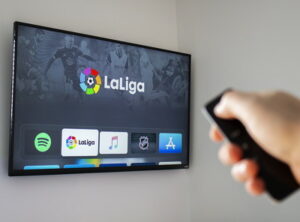 In addition to sports sanctions, possible financial charges could really cripple the club whose financial situation is already far from solid. La Liga will also be affected, as Barcelona is an essential part of the league and its worldwide popularity and branding.
In addition to sports sanctions, possible financial charges could really cripple the club whose financial situation is already far from solid. La Liga will also be affected, as Barcelona is an essential part of the league and its worldwide popularity and branding.
The Catalan club came only second to Real Madrid in respect to revenue generated by Spanish clubs and seventh overall during the 2021/22 season. With Barcelona generating €638.2 million in revenue, while Real Madrid generated €713.8 million. The third-ranked Spanish side, Atlético Madrid, made €393.9 million during the same period. This was only 62 percent of Barca’s revenue.
During the season prior (2020/21), all La Liga sides made a combined €2.948 billion. 41.5 percent of this amount was generated by the two giants Barcelona and Real Madrid. Between 2017/18 and 2019/20 (seasons not impacted by COVID-19) this was even between 45 and 48 percent. It shows the differences among La Liga clubs in terms of income, and thus spending abilities, but also indirectly how important Barcelona and Madrid are for the league.
Barcelona & Real Madrid’s importance and size within La Liga
| Who | Revenue 2020/21 | As percentage of La Liga revenue | Revenue 2018/19 | As percentage of La Liga revenue |
|---|---|---|---|---|
| La Liga | €2,948 million | – | €3378 million | – |
| Barcelona | €582.1 million | 19.7% | €841 million | 24.9% |
| Real Madrid | €640.7 million | 21.7% | €757 million | 22.4% |
| Barca + Real | €1,222.8 million | 41.5% | €1598 million | 47.3% |
Audience pulling power of Barcelona and Real Madrid
 The pulling power and importance of Barcelona and Real Madrid is also visible in the TV audience. Numbers of the first 30 matchdays of the 2017/18 season showed how Real Madrid and Barcelona had the highest average audience with respectively almost 1.26 million and 1.22 million viewers per match. Atlético Madrid reached an average audience of 0.55 million, while the rest of La Liga teams were below half a million viewers per match during the indicated period. That is not even half of the audience that Real Madrid and Barcelona could attract.
The pulling power and importance of Barcelona and Real Madrid is also visible in the TV audience. Numbers of the first 30 matchdays of the 2017/18 season showed how Real Madrid and Barcelona had the highest average audience with respectively almost 1.26 million and 1.22 million viewers per match. Atlético Madrid reached an average audience of 0.55 million, while the rest of La Liga teams were below half a million viewers per match during the indicated period. That is not even half of the audience that Real Madrid and Barcelona could attract.
Especially after the COVID-19 pandemic, most Spanish clubs have a severely limited spending budget due to La Liga’s financial fair play regulations. The importance of Barcelona and Real Madrid and their pulling power is therefore even greater.
If the allegations against Barcelona are proven true, sports and financial sanctions are absolutely required for the league’s integrity, but it could have a detrimental effect to La Liga’s value and its ability to compete with the other Big Five leagues.
Risky strategies for on-field success
 It is not the first time Barcelona makes the headlines with controversial governance. The club was heavily featured in the news during the summer of 2022 for selling the club’s ‘economic levers’ in a bid to stretch the club’s short term spending budget and invest in new players. This despite a rumoured debt of over €1 billion at the time.
It is not the first time Barcelona makes the headlines with controversial governance. The club was heavily featured in the news during the summer of 2022 for selling the club’s ‘economic levers’ in a bid to stretch the club’s short term spending budget and invest in new players. This despite a rumoured debt of over €1 billion at the time.
These levers consisted of selling 49.9 percent of the ‘Barca Licensing and Merchandising’ company and 25 percent of its domestic La Liga rights over a 25-year period. Although it did not impact the revenue generated in 2021/22, it will alter the club’s future income streams. The strategy is legal, but risky according to experts. With possible financial and sports sanctions on the horizon due to the Negreira-case, it is a tricky and serious situation for the club.
The Neymar transfer saga
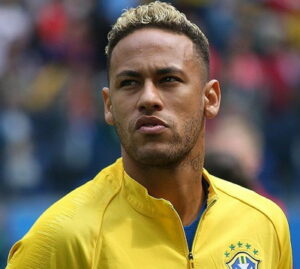
Кирилл Венедиктов, CC BY-SA 3.0 GFDL, via Wikimedia Commons
In the past, Barcelona has been willing to go far to invest in quality acquisitions and consequently hopefully obtain on-field success. It has resulted in scandals, most notably that of the transfer of Neymar from Brazilian side Santos in 2013. When a club member demanded to know how the Brazilian attacker was acquired, the results led to club president Sandro Rosell resigning.
Initial statements alleged that Neymar was bought for €57 million. However, the transfer fee was in fact close to €100 million as the club also paid €40 million to the player’s father. A first payment of €10 million in 2010 and a second one of €30 million in 2013. An ‘oversight’ that made Brazilian investment fund DIS, who owned 40 percent of Neymar’s sporting rights at the time of the transfer, argue that they missed out on income due to the deal’s true value being hidden.
In 2016, an agreement was reached with prosecutors that saw the club pay a $5.5 million fine because of ‘an error in tax planning’.
FC Barcelona – Neymar transfer saga
| What | Amount | Note |
|---|---|---|
| Initial reported fee | €57 million | For acquiring the player from Santos |
| Investment fund DIS | 40% of fee | Missed out as deal’s true value was hidden |
| Neymar’s father | €40 million | €10 million (2010) + €30 million (2013) |
| Actual transfer fee | €100 million | Initial reported fee + father’s fee |
| Financial sanction | $5.5 million | Accepted fine for ‘error in tax planning’ |
La Liga dealing with match fixing
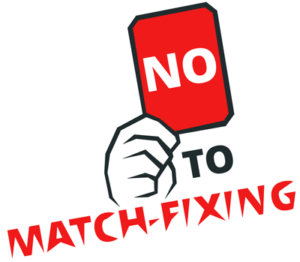 La Liga has had to deal with other scandals in recent times as well. Most notably the match fixing allegations of a La Liga fixture between Levante and Real Zaragoza in April of 2011. Zaragoza avoided relegation in the final match round by beating Levante 2-1. With Levante players supposedly receiving €965,000 to throw the game. The money was said to be paid by Zaragoza players who received the money in the form of bonuses for avoiding relegation.
La Liga has had to deal with other scandals in recent times as well. Most notably the match fixing allegations of a La Liga fixture between Levante and Real Zaragoza in April of 2011. Zaragoza avoided relegation in the final match round by beating Levante 2-1. With Levante players supposedly receiving €965,000 to throw the game. The money was said to be paid by Zaragoza players who received the money in the form of bonuses for avoiding relegation.
In December of 2019, the court cleared 41 people involved in the case of wrongdoing as there was insufficient evidence of a crime. However, a former Zaragoza president and financial director were handed 15-month prison sentences for falsifying documents. While most people involved were acquitted, the case took eight years and damaged the reputation of players, teams, and the league.
Juventus at the heart of the Plusvalenza scandal
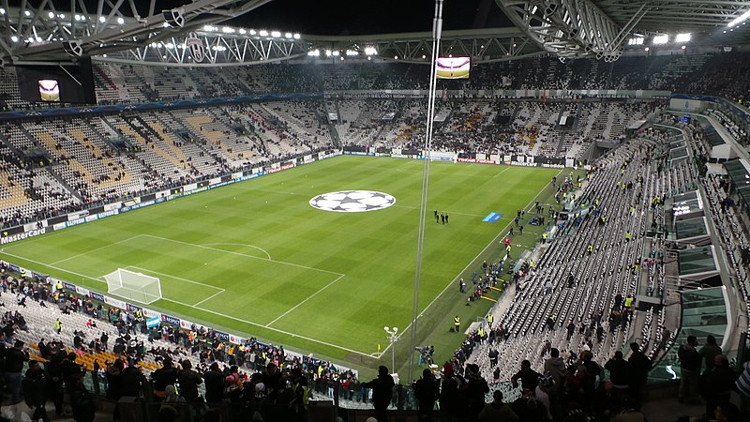
forzaq8 from kuwait, kuwait, CC BY 2.0, via Wikimedia Commons
Italian giants Juventus has had its fair share of scandals as well, with the latest scandal involving plusvalenza, the Italian term for capital gains.
Italian football authorities accused Juventus of inflating player valuations while making swap deals with other football clubs. They could then report these higher values as capital gains, which has favourable accounting effects in the short term.
The prosecutor said Juventus were involved in 42 such suspicious transaction between 2018/19 and 2020/21. While reports suggested the club made a total of €282 million in capital gains from swap deals.
The Pjanic-Arthur swap

Kirill Venediktov, CC BY-SA 3.0 GFDL, via Wikimedia Commons
The best example of such a suspicious Plusvalenza swap deal is the transfer of Miralem Pjanic from Juventus to Barcelona and Arthur Melo who moved in the opposite direction in the summer of 2020. Pjanic was sold for €60 million to Barca, while his market value at the time was said to be €45. Arthur was bought for €76 million, while his market value was estimated to be €56 million.
It is not unheard of that players are traded above market value. Liverpool has also paid above market value for several promising players, like Virgil van Dijk, in recent years. However, it is the swap deal where little cash changes hands that makes it suspicious according to prosecutors. Add to this that both clubs were rumoured to have financial difficulties, and the trade can be deemed remarkable.
Both players did not have a successful spell at their new club either. Pjanic played 1,295 minutes across 30 matches (43 minutes per match) in 2020/21 before going out on loan to Beşiktaş for a year. In September 2022, the midfielder was let go for free to Sharjah FC (UAE Pro League). In two seasons at Juventus, Arthur Melo played 3,247 minutes across 63 matches (52 minutes per match). The Brazilian is now on loan at Liverpool.
High value swap deals of Juventus in 2019/20 and 2020/21
| Season | Other club | Player in | Transfer fee | Market value | Player out | Transfer fee | Market value |
|---|---|---|---|---|---|---|---|
| 2019/20 | AS Roma | Luca Pellegrini | €22m | €5m | Leonardo Spinazzola | €29.5m | €15m |
| 2019/20 | Man. City | Danilo | €37m | €20m | João Cancelo | €65m | €55m |
| 2020/21 | Barcelona | Arthur Melo | €76m | €56m | Miralem Pjanic | €60m | €45m |
| 2020/21 | Genoa | Nicolò Rovella | €26m | €4m | Manolo Portanova | €12m | €1m |
In May of 2022, however, Juventus was cleared of any wrongdoing together with 10 other Italian football clubs. The reason behind the dismissal of the case at the time, being that precise valuations are difficult to determine and both clubs agreed to the valuations, so it was not deemed illegal.
New evidence, case reopened

Despite not being illegal, prosecutors believed that it goes against being transparent with shareholders. A requirement for Juventus as they are listed on the stock exchange and such companies must adhere to strict financial regulations and reporting standards. It also goes against fair and ethical reporting and conduct. As prosecutors found new evidence to indicate that Juventus knew what they did was not truly above board, the case was reopened.
It resulted in a new trail, and in January of 2023 the club were found guilty of transfer irregularities resulting in a 15-point deduction to be applied during the 2022/23 season. Prosecutors initially asked for a nine-point deduction. Yet, as Juventus had climbed the league table between opening the case and the court ruling, a higher amount was deemed appropriate for the sports sanction to have a similar effect. Namely having less chance of securing a European ticket for next season as European football normally leads to higher revenue. In addition to the sports sanction, eleven current and former club directors were suspended for various periods.
It should be noted that Juventus was not the only club under investigation in the Plusvalenza-scandal and more clubs, like Napoli, could face charges in the future.
Prisma scandal
 The actions of Juventus in the Plusvalenza scandal came to light because of a second investigation by authorities called Prisma. That criminal investigation was opened in May 2021 and looks at several Italian clubs. In the case of Juventus, it concerns false accounting, concerning player contracts and transfers between 2018 and 2020.
The actions of Juventus in the Plusvalenza scandal came to light because of a second investigation by authorities called Prisma. That criminal investigation was opened in May 2021 and looks at several Italian clubs. In the case of Juventus, it concerns false accounting, concerning player contracts and transfers between 2018 and 2020.
During the COVID-19 pandemic, Juventus’ players supposedly agreed to reduce their salaries for a four-month period to help the club during financial hard times. Juventus had a combined net loss of €300 million during the 2019/20 and 2020/21 seasons. It is now alleged that players only gave up on one month and the rest was handled off-book.
In November 2022, Juventus’ entire board of directors resigned so a new board could face all the investigations. While UEFA opened their own investigation amid the false accounting allegations in December of the same year.
Calciopoli
 The Plusvalenza and Prisma scandals are again a stain on Italian football. Just like Calciopoli, a scandal that hit Italian football in the run-up to the 2006 World Cup won by the Azzurri. In May of 2006, wiretaps uncovered relationships between clubs’ executives and referees during the season prior. 19 matches taking place between November 2004 and May 2005 were investigated. Not for direct match fixing but for clubs influencing the appointment of certain referees. Ones that would be favourable to their club.
The Plusvalenza and Prisma scandals are again a stain on Italian football. Just like Calciopoli, a scandal that hit Italian football in the run-up to the 2006 World Cup won by the Azzurri. In May of 2006, wiretaps uncovered relationships between clubs’ executives and referees during the season prior. 19 matches taking place between November 2004 and May 2005 were investigated. Not for direct match fixing but for clubs influencing the appointment of certain referees. Ones that would be favourable to their club.
Juventus was hit hardest with one of the severest sports sanctions in recent times, and got stripped of two league championships and got relegated to the Serie B. In 2015, many prison sentences for sporting directors and referees were overturned due to the statute of limitations.
A follow-up investigation showed that there were far more clubs involved apart from Juventus, including Inter and Milan. However, no charges were brought forward due to the statute of limitations.
Eventually no match fixing violations were found to be committed by Juventus. The club was absolved from wrongdoing and the season was deemed fair and legitimate. Yet, the damage to Italian football, and most of all to Juventus, had been done.
Man City investigated again after earlier dismissal
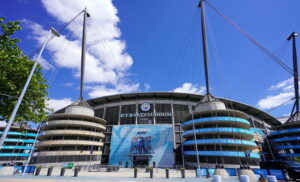 Like Juventus, Manchester City’s name has come up in fraud and alleged regulations breaches in recent times. In February of 2023, the Premier League made a statement that they ‘referred a number of alleged breaches of the Premier League Rules by Manchester City Football Club to a Commission’. The more than 100 alleged breaches of rules took place since the 2009/10 season and cover over a decade. During this period Manchester City won six Premier Leagues, two FA Cup’s and six League Cups.
Like Juventus, Manchester City’s name has come up in fraud and alleged regulations breaches in recent times. In February of 2023, the Premier League made a statement that they ‘referred a number of alleged breaches of the Premier League Rules by Manchester City Football Club to a Commission’. The more than 100 alleged breaches of rules took place since the 2009/10 season and cover over a decade. During this period Manchester City won six Premier Leagues, two FA Cup’s and six League Cups.
The allegations come down to Manchester City not providing accurate financial information. One of the beliefs is that they artificially inflate (i.e., overvalue) their sponsorship deals to raise their revenue. However, like the plusvalenza case with player values, sponsorship valuation is not an exact science, and it is thus difficult to prove whether it is legal or not. Higher revenue coming from the ‘right’ sources, such as sponsorship income, would give clubs, City in this case, more room for spending while adhering to Financial Fair Play regulations.
Questions raised about related parties and operating costs
In addition to allegedly not giving a true and fair representation of income streams, the Premier league also has suspicions about the true nature of certain related parties.
Furthermore, it is believed that the club is not honest about their operating costs and has not disclosed certain contractual payments to staff.
Earlier European ban overturned by CAS

Oldelpaso, CC BY-SA 3.0, via Wikimedia Commons
The club denies any wrongdoing and is surprised by the allegations, like how they felt and reacted when similar accusations arose in 2019. Back then UEFA’s club financial control body alleged City had breached financial fair play regulations by misstating income sources in multiple deals. In one such case the company owning City, the Abu Dhabi United Group, was said to have funded sponsorship payments of £30 million across 2012 and 2013 but had reported the payments as independent sponsorships from the telecommunications company Etisalat.
Those allegations eventually led to a two-year suspension from the Champions League by UEFA and a €30 million fine in February of 2020. However, City appealed the decision in June 2020 and the Court of Arbitration for Sport (CAS) overturned the ban and reduced the fine to €10 million. CAS’ main reason for overturning the decision was the statute of limitations. When the charges were brought in May of 2019, the alleged breaches had already taken place five years prior. So, the allegations were not truly debunked, but a technicality resulted in no sports sanctions.
Need to raise revenue before spending
 In the coming years the temptation for establishing such grey sponsorship deals may become even greater. Stricter regulations dictate that the amount of revenue generated will determine to a greater extend how much clubs can spend. For example, a new salary rule will limit the ratio of wages to revenue generated to 70 percent in 2025/26.
In the coming years the temptation for establishing such grey sponsorship deals may become even greater. Stricter regulations dictate that the amount of revenue generated will determine to a greater extend how much clubs can spend. For example, a new salary rule will limit the ratio of wages to revenue generated to 70 percent in 2025/26.
Based on the numbers reported by City, they would not have a problem adhering to this rule. During the 2021/22 season, the club had a 57 percent wages to revenue ratio, down five percent-point compared to the previous season (2020/21: 62 percent).
City’s revenue has risen enormously since 2009/10
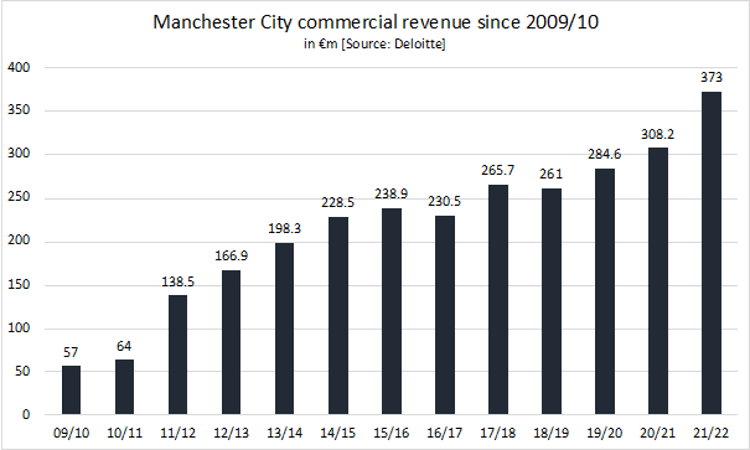
During the period in which Manchester City allegedly breached the rules according to the Premier League, the club’s commercial revenue has multiplied by more than 6.5. In the 2009/10 season, City generated €57 million in commercial revenue, while this was €373 million during the 2021/22 season. The club has of course transformed itself on and off the field during this time and has moved up the ranks of Europe’s ‘richest’ clubs.
The last two years, City even topped Deloitte’s list of clubs generating the most revenue. This despite generating the least amount of matchday revenue (€64 million) amongst the top 10 clubs during the 2021/22 season. The club generated a lot of broadcasting revenue (€294 million) as a member of the Premier League, yet commercial revenue accounted for 51 percent of overall revenue.
Amongst the top 10 clubs, only PSG (€383 million) and Bayern Munich (€378 million) made more money commercially than Manchester City (€373 million) during the 2021/22 season. This position could well be down to the club’s increasing popularity, sporting successes and smart business strategies. On the other hand, the latest allegations combined with commercial revenue being partly determined by the size of sponsorship deals, raises questions.
For football it would be best if these questions get clear answers. However, the past has shown that allegations of these kinds are difficult to prove or debunk in court. And when proof is provided, there are issues such as statute of limitations, interpretation and other technicalities that prevent the severest of financial and sports sanctions. In the end, the scandals, whether they are just allegations or truly proven, just harm the perceived integrity of the sport.



